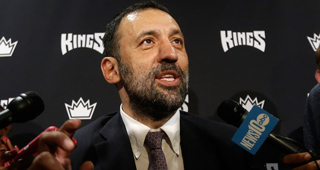The Sacramento Kings aren’t known for showing restraint. Instead, over the past few years, they’ve repeatedly self-combusted by mixing reckless ambition with short-sighted goals. Make the playoffs! Keep DeMarcus Cousins happy! Random loud noises!
They’ve predictably fallen flat on their face, over and over again. Armed with the vaguest understanding of just how complex the NBA’s Collective Bargaining Agreement truly is, Kings general manager Vlade Divac has spent his entire tenure as the butt of a never-ending joke.
Last summer, he engineered a miniature oil spill by heedlessly mortgaging Sacramento’s future for the opportunity to sign Rajon Rondo (now on the Chicago Bulls), Kosta Koufos and Marco Belinelli. The Kings stuck up their nose towards valuable commodities (draft picks and rookie-scale contracts) the rest of the league has never fought harder to hoard. Their 2017 first-round pick belongs to Chicago if it falls out of the top 10, and the Philadelphia 76ers outright own their 2019 first-round pick with swap rights in 2017 that are protected outside the top 10.
For an organization that hasn’t won a playoff series since 2004, it’s a total disaster. But after hiring Ken Catanella as Divac’s right-hand man three months ago, Sacramento has (for the most part) avoided any self-inflicting wounds. Instead, they’ve tapped the brakes and signed modest free agents on fliers that won’t hurt their long-term cap sheet.
The draft was a little messy—trading the eighth overall pick back for numbers 13, 28 and Bogdan Bogdanovich is not a good idea, particularly when the 13th pick is used on an unknown 19-year-old named Georgios Papagiannis, a big man who can’t co-exist with the franchise player—but they didn’t give 30-year-old Rondo a lengthy contract or trade for Monta Ellis.
With plenty of cap space to fill, they side-stepped a shopping spree, even after teams in their conference signed Timofey Mozgov, Luol Deng and Evan Turner to a combined $206 million over 12 years. Did Divac want to spend $80 million on Ryan Anderson? Probably, but he didn’t. Progress!
The first sign of change began on draft night, when they shipped Belinelli to Charlotte for the 22nd overall pick (a coup, regardless of whether Syracuse’s Malachi Richardson ever becomes a productive NBA player). It was the type of forward-thinking deal that’s hardly ever associated with Sacramento.
To the general population’s great surprise, their prudence bled into free agency, where Sacramento decided not to splurge, choosing instead to lock down capable veterans on manageable deals. In today’s economy, a contract’s length can be more important than it’s price tag. Short is sweet.
Arron Afflalo and Anthony Tolliver both signed two-year contracts that are non-guaranteed in year two. Matt Barnes signed for two years and $12 million, with a $6 million player option in 2018. Garrett Temple agreed to a three-year, $24 million contract with a player option in the final season.
None of these players can start on a good NBA team and all are declining. But they’re quality role players who supply the type of depth Sacramento didn’t have last season. More importantly, none can ruin the Kings’ prospective good health.
Next summer is Sacramento’s final chance to enhance the roster and convince Cousins that he should stay put. He’ll be a free agent in 2018, and assuming Barnes and Rudy Gay opt out, Divac should have enough cap space to offer at least one max contract elsewhere.
Whether they can land someone worthwhile is a different question, but simply putting themselves in that position without needing to scramble around and dump salary is a huge plus.
Pending a possible lockout and changes to the next CBA, the Kings will also have enough space to renegotiate and extend Cousins’ current deal, a la James Harden and the Houston Rockets. Unlike that situation, the Kings don’t have enough room to extend Cousins right now, but they can create it by trading Gay, or Koufos and McLemore.
A veteran extension would turn Cousins’ bargain deal into what he’s actually worth, which isn’t ideal from Sacramento’s perspective. But it’d still come with a couple major benefits: 1) It’d keep him under contract for at least one extra season, and 2) it’d increase his trade value. Any team—say, the Boston Celtics—that’s hesitant to fork over too many assets for a player who can bolt after one season would be less concerned about doing so.
Having the flexibility to keep Cousins around is important and just may be the smartest way for them to fill that space moving forward. It’ll take years for Sacramento to repair its image as a nuclear wasteland; it’s fair to wonder if any All-Star free agents will take their money as early as next summer, especially if Cousins has the option to bounce one year later.
It’s unknown whether the two-time All-Star would want to extend his current deal or hit the open market in July 2018, but until now and then the Kings have marginally increased their odds to keep him.
For a franchise that’s become synonymous with blowing its own toes off, this summer is a solid step in the right direction. All they had to do was avoid self sabotage.



